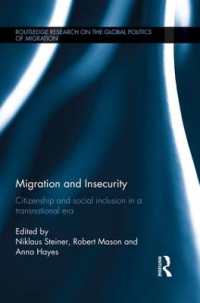Full Description
With the exception of Sri Lanka, South Asian countries have not achieved quality basic education - an essential measure for escaping poverty, inequality, and social exclusion. In The Political Economy of Education in South Asia, John Richards, Manzoor Ahmed, and Shahidul Islam emphasize the importance of a dynamic system for education policy.
The Political Economy of Education in South Asia documents the weak core competency (reading and math) outcomes in government primary schools in India, Pakistan, Bangladesh, and Nepal, and the consequent rapid growth of non-government schools over the last two decades. It compares the training, hiring, and management of teachers in South Asian schools to successful national systems ranging from Singapore to Finland. Discussing reform options, it makes the case public good and public priorities are better served when both public and non-government providers come under a strong public policy and accountability framework.
The Political Economy of Education in South Asia draws on the authors' broad engagement in education research and practice in South Asia, as well as analysis by prominent professors of education and NGO leaders, to place basic education in a broad context and make the case that universal literacy and numeracy are necessary foundations for economic growth.
Contents
Foreword
Preface
Part One: Diagnostics: Chronic Quality Deficit in South Asia's Basic Education
Introduction to Part One
1. Growth, Wellbeing and Basic Education
2. From "Education for All" to SDG4
3. Primary School Performance in Reading and Mathematics
4. Why Low Quality Persists in South Asia's School Systems
5. The Sri Lanka Exception and Its Stubborn Challenges
Part Two: Teachers: The Pivot of Educational Change
Introduction to Part Two
6. The Education Workforce - Numbers and More
7. Who should be teachers - Features of a High-Quality Education Workforce
8. How teachers can be professionals - Preparing and Orienting the Education Workforce
9. Governance and Management of the Education Workforce
10. Ethics and Values Education and Teachers
Part Three: The Political Economy of Educational Change
Introduction to Part Three
11. Private Schools and Public Good
12. Toward a New Education Governance Paradigm
13. Political Economy of Education - Leveraging Change








